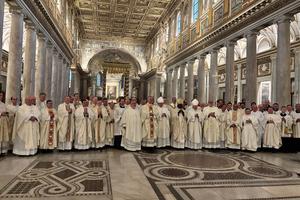Cardinal Burke On His New Appointment to Church’s Highest Court
Says his role as a member will allow him to assist in the work of the Supreme Tribunal of the Apostolic Signatura, serve as a judge when asked to do so, but it is not a full time position.

Cardinal Raymond Burke has said his appointment last week as a member of the Supreme Tribunal of the Apostolic Signatura, the Church’s highest judicial authority, is not a full-time position but will allow him to serve as one of the court's judges when requested.
“Some of the faithful have misunderstood the appointment, thinking that I am now returning to serve full-time in the offices of the Apostolic Signatura,” Cardinal Burke said in an Oct. 2 statement responding to enquiries from journalists. “Members of the Roman dicasteries, apart from the prefect, do not serve full-time but offer their assistance, when it is requested by the prefect.”
The cardinal added: “The members of the Apostolic Signatura serve as judges — when they are called to do so — of the various cases which are brought to the Apostolic Signatura for resolution. Also, from time to time, the Apostolic Signatura holds a plenary session of its members to discuss important questions regarding the administration of justice in the Church.”
The Vatican announced Pope Francis’ appointment of Cardinal Burke on Sept. 30, along with four other new members: Cardinals Agostino Vallini, Edoardo Menichelli, and Msgrs. Frans Daneels (different from Belgian Cardinal Godfried Danneels) and Johannes Willibrordus Maria Hendriks.
Cardinal Burke, an expert in canon law, served as prefect of the Apostolic Signatura from 2008 to 2014 before Pope Francis appointed him patron of the Order of Malta.
The American cardinal explained that the role of cardinals of the Church is to be “principal advisors of the Holy Father, ‘the senate of the Holy Father,’ as we are sometimes called.” As such, he said they are asked to serve as “members of the various dicasteries of the Roman Curia — that is the congregations, tribunals and pontifical councils which assist the Roman Pontiff in his governance of the universal Church.”
He stressed that having received his appointment, he will “strive to serve this most important tribunal of the Roman Curia to the best of my ability.”
The Supreme Tribunal of the Apostolic Signatura, similar to a nation’s Supreme Court, is one of three courts within the Holy See, the others being the Apostolic Penitentiary and the Tribunal of the Roman Rota. The Signatura acts as a tribunal of appeal of certain matters from the Roman Rota.
The work of a Roman dicastery member is not usually very intense, and the plenary meetings of the Apostolic Signatura are held only every two or so years.
Surprise Appointment
Cardinal Burke's appointment came as a surprise to many as Pope Francis and the cardinal have had differences over the Holy Father’s apostolic exhortation on marriage and the family, Amoris Laetitia, culminating in him and three other cardinals submitting to Pope Francis five questions, or dubia, in order to seek clarity on the document. The Pope has chosen not to respond to the initiative.
Those differences, which date back to the synods on the family and whether to allow unrepentant remarried divorcees living in a state of adultery to receive Holy Communion, as well as the cardinal’s opposition to streamlining the annulments process, are thought to have led to Francis removing the cardinal as prefect of the Apostolic Signatura in 2014.
But the cardinal stressed in an interview last month with Australian journalist Jordan Grantham that these differences have been exaggerated to falsely portray him as “the enemy” of the Pope.
“It’s all a caricature,” he said. “They depict Pope Francis as a wonderful, open person and there’s nothing wrong with that, but they depict me as just the opposite.”
“It’s meant in a certain way to advance their own agenda, but the Pope is actually not in favour of their agenda,” he added. “They use this kind of technique to make it seem like he is, and that’s fundamentally dishonest.”
The cardinal said these those pushing this agenda are “making a caricature of someone who’s asking for clarity about certain matters, they’re saying ‘well, he’s the enemy of the Pope’ and he’s trying to build up opposition to the Pope, which of course isn’t the case at all.”
Throughout the dispute over the issue, the cardinal has stressed he is acting on his conscience, for the good of the Church, the papacy and the individual souls of the faithful.
“The urgency of a response to the dubia derives from the harm done to souls by the confusion and error, which result, as long as the fundamental questions raised are not answered in accord with the constant teaching and practice of the Church,” Cardinal Burke said in the interview.
“The urgency weighs very heavily on my heart,” he said, adding he has seen “a great deal of confusion, also people feeling that the Church is not a secure point of reference.”
The cardinal said his appointment will not change, or delay, his plans to issue a fraternal correction of the Pope if the Holy Father continues not to respond to the dubia.
- Keywords:
- cardinal raymond burke
















